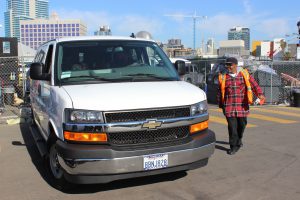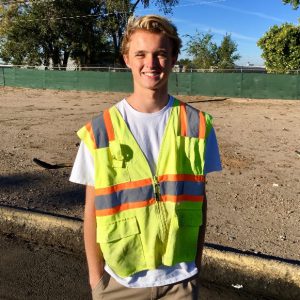Teen Brings Program that Provides Jobs for Homeless to San Diego
Starting this week, San Diego’s homeless can work and receive compensation through a new program introduced by a local teenager.
Kevin Barber, 16, decided he wanted to do something for San Diego’s 11,000 homeless people, following the recent Hepatitis A outbreak.
The San Diego teenager told his mom, an ER doctor who works constantly with the homeless, about a viral video he saw online of a program in Albuquerque called “There’s a better way,” which helps employ homeless people and pays them in cash.
Barber convinced his mother to take him to Albuquerque with the interest of launching a similar program in San Diego. After their trip, they modeled a new program that will provide day jobs for interested homeless individuals in the City of San Diego, called “Wheels of Change.”
Both Barber and his mother pitched their idea to the mayor’s office, and San Diego Mayor, Kevin Faulconer, decided to support the program, as well as San Diego Councilmember Scott Sherman.
“I wanted to do this because there is so many homeless people in San Diego and I feel they are not given enough opportunities,” said Barber to La Prensa San Diego.
Bob McElroy, CEO of Alpha Project, a nonprofit with more than 30 years of experience in serving the homeless population, is in charge of the program that started on Monday, Feb. 26.
Two days a week, a van will pick up homeless people who express an interest in working and will drive to a designated site to pick up trash, pull weeds, and clear brush, for a total of five hours.
At the end of the day, workers will be driven back to Alpha Project, or the City’s tent structures for the homeless, and will be compensated for their work.
In addition to giving individuals the work, the “Wheels of Change” program will also connect them with important services and help assist with transitioning to permanent housing.
The program is based on Albuquerque’s “There’s a Better Way” program which started as a six-month pilot program, but now has two vans that run five days a week and employs up to 20 homeless individuals a day. Over a dozen cities have implemented a similar program including Austin, Chicago, Denver, Lexington, Portland, and Seattle.
“This is all about creating more opportunities for homeless individuals to lift themselves out of extreme poverty,” Faulconer said. “Wheels for Change will help restore dignity by allowing people to earn a paycheck and begin to get back on their feet. For many this may be just the chance they need to begin turning their lives around.”
Since the program in Albuquerque began, over 3,400 homeless received jobs, 368 individuals connected with employment services and obtained additional work, over 175,000 pounds of trash was removed, and 600 neighborhood blocks were cleaned.
“An important step to a successful transition out of homelessness is re-exposure to the dignity of work,” Sherman said. “The Wheels of Change program provides the opportunity to participate in this confidence building experience.”
The first six months of the program have been funded by a private donation made by Barber’s mother, Dr. Carolyn Barber.
The donation helped pay for the van, and the remaining funds will be used to pay the workers minimum wage for the next six months.
“This program is a self-esteem builder, to be looked upon as an asset instead of a liability,” McElroy said. “This gives the participants something to do while they wait for housing.”
Cornelius Porter, one of the first program participants, is a Chicago native that has been living in California for over 30 years and is currently residing in the Alpha Project tent.
“Right now, I want to give back to the community for the space I been given at the Alpha Project tent,” Porter said. “The life in the street and being unemployed is really hard, this tent is saving people’s lives.”


 Ana Gomez Salcido
Ana Gomez Salcido





